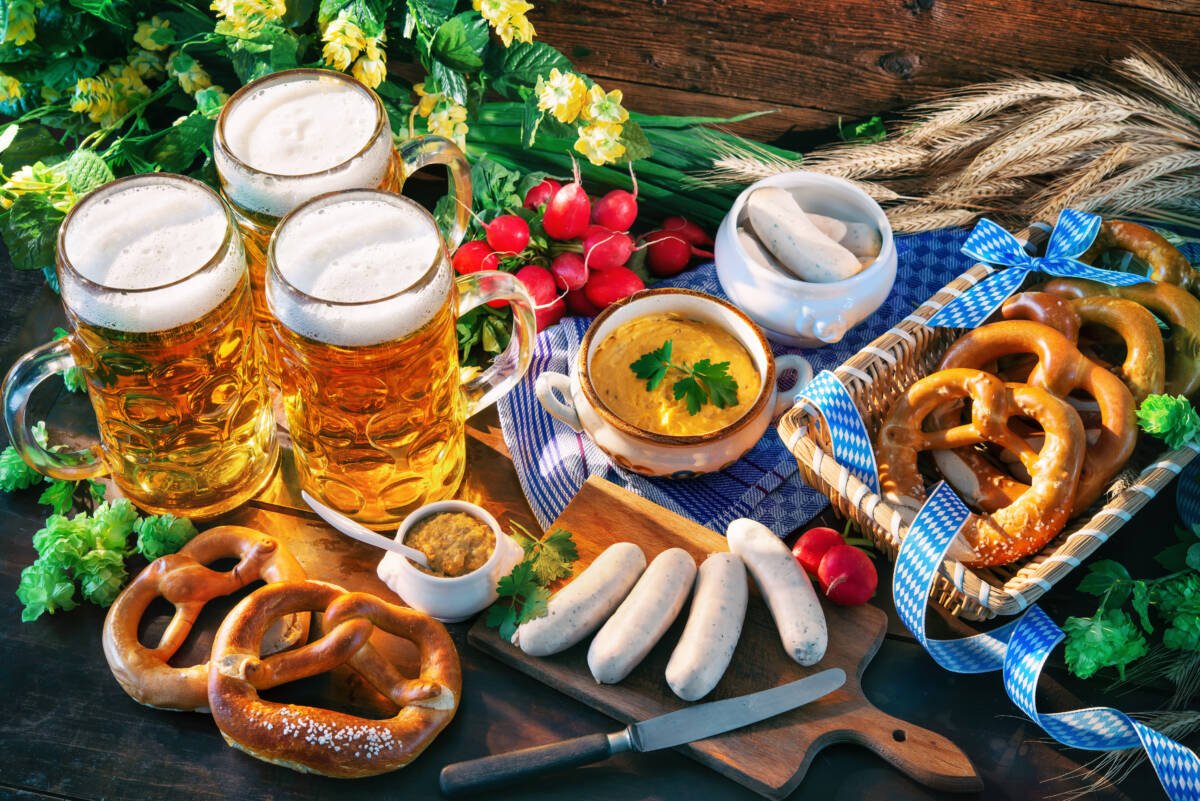Beer is not only considered as the national drink of Germany, but also part of their culture as drinking beer brings people together, and taking part in this tradition is one of the best things to do in Munich.
The state of Bavaria has a brewing tradition of nearly 1000 years and the brewers in and around Munich have mastered the craft since time immemorial. In fact, every year six million people come from 40 countries around the world just to attend the Oktoberfest.
In this post we will explore the history, culture, and traditions of Munich beers. We’ll profile the six biggest Munich breweries – known as the “The Big 6”, introduce you to the popular types of beers in Munich, followed by a Munich brewery tour – festivals and events and much more……
History of Beer in Munich
Munich’s beer history is long and embedded in their culture. It’s home to the world’s oldest brewery which is still in action and dates back to the 7th century.
Right from the beginning Munich’s breweries had religious roots and monks living in monasteries were the first brewmasters. They would use beer as incentives to encourage people to attend church and would offer them with free beer on Sunday and other religious festivals.
Soon beer became very popular with the masses and the royal families of the time got involved in the profitable beer industry. They taxed beer to earn more revenue.
As the years passed, more and more prominent families of the time got into beer production and soon the brewing industry boomed.
The Purity Law
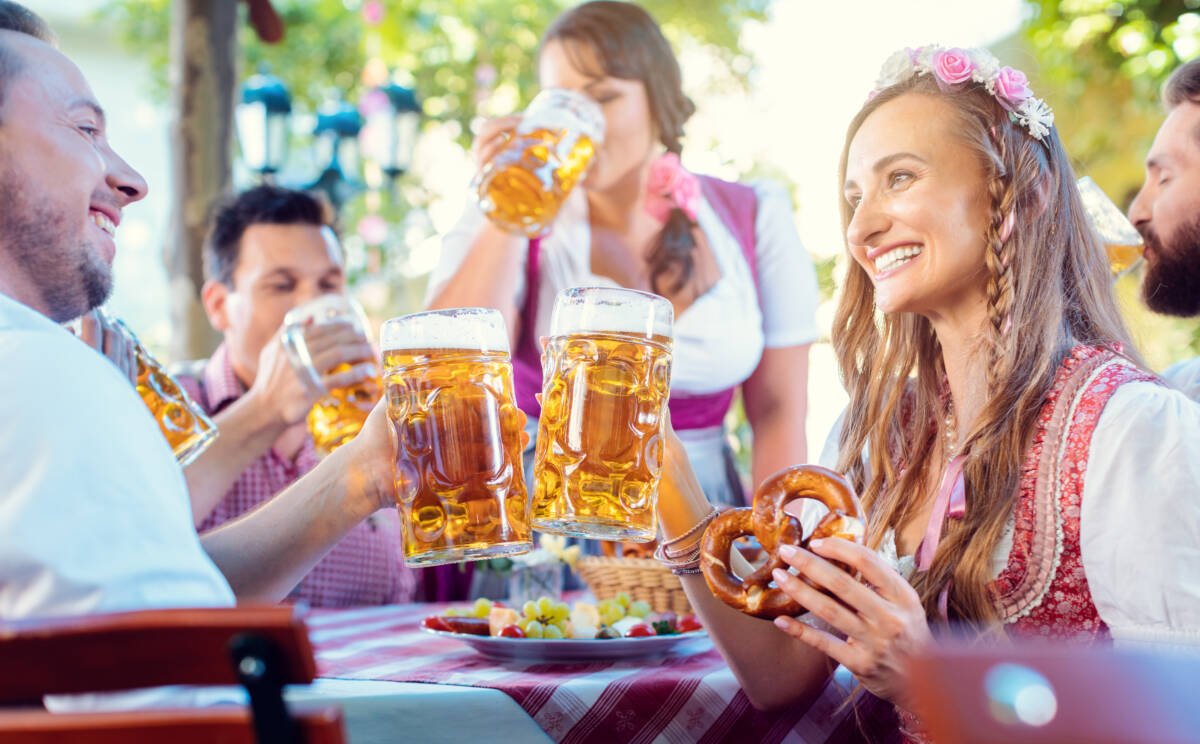
Over the next few centuries, brewing became an ad-hoc affair, and nasty things like tree bark, moss or animal fat were often mixed for want of quality ingredients.
So, in 1516, the Bavarian Beer Purity Law (Bayerische Reinheitsgebot) was introduced by Duke Wilhelm IV and his brother Ludwig X. The law stated that beer must be made with only barley, hops, water (yeast was later added) or it could not be called beer.
The Reinheitsgebot is the world’s oldest and most famous food regulation and many breweries in Bavaria still stick to it even though it hasn’t been the law for many years now. This sets Bavarian and Munich beers apart with a seal of quality.
And if any additional ingredients or flavours are used in the brewing process such as orange, sugar or chocolate, then the brew cannot be legally called beer.
Beer Gardens
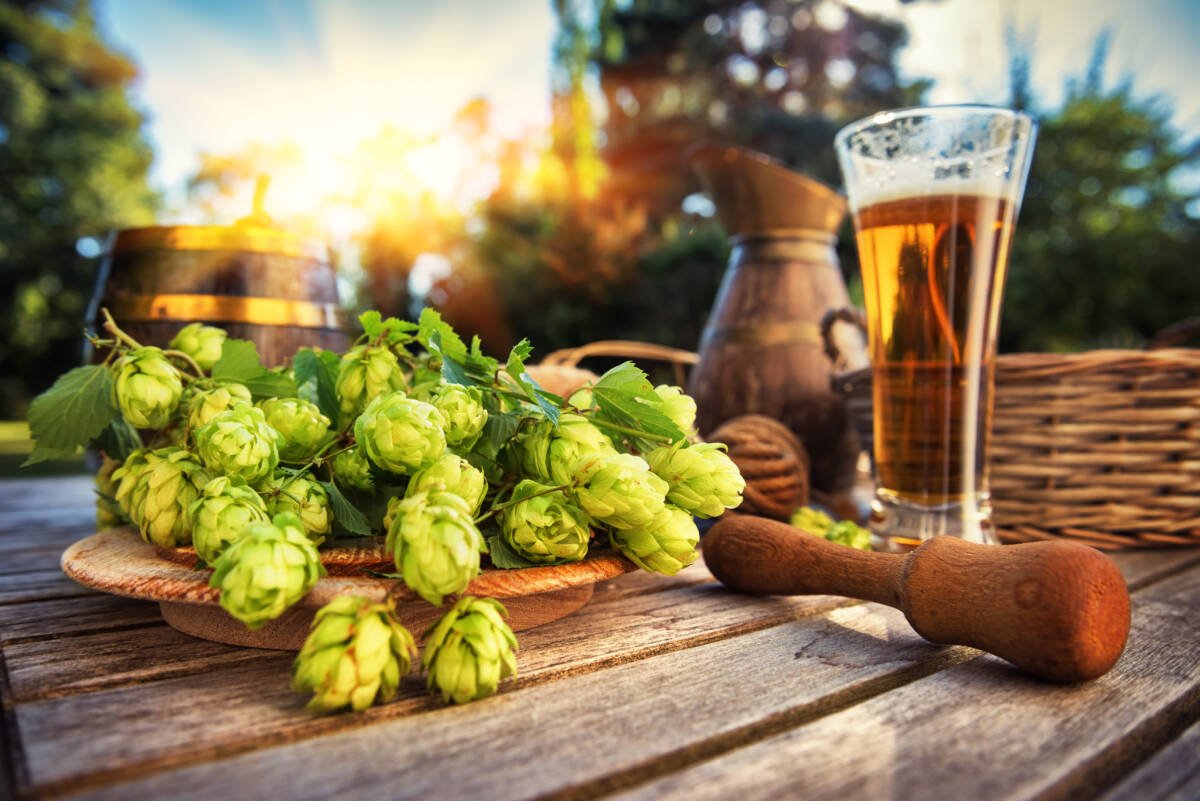
Again, in the 16th century a law was passed in Germany that beer could not be brewed in the summer months. The lack of refrigeration in those days and warm weather seriously affected the quality of beer. Legally, in those day’s beer could only be brewed from September to April using a bottom-fermenting technique with yeast capable of fermenting in cold temperatures.
So, the brewers of the time came up with an idea and dug out cellars to store beer in a cool place during the summer months. They stacked the cellars with beer and planted chestnut trees above them to keep the area cooler. They soon started using this outdoor space to sell beer, and the concept of the beer garden was born. In present times, there are over 60 beer gardens in Munich.
Second World War
Munich beers also played an important role during the Second World War. The notorious Beer Hall Putsch (coup) took place in Munich. Hitler had attempted to take over the Bavarian government and occupied a local beer hall, Bürgerbräukeller.
However, after the Second World War, the booming beer industry crashed and many of Munich’s breweries were forced to shut down as the German economy struggled.
Munich Beers Today
In the later part of the 20th century, the Munich breweries began to recover, and today contributes billions of Euros to the Munich and German economy. The famous Oktoberfest alone generates around 1.2 billion in two weeks.
Also, many families in Munich prospered as they got involved in the beer industry. Today, they own Oktoberfest tents or operate breweries, or own a Keller that serves beer from one of Munich’s six most famous breweries.
Popular Types of Beer in Munich

The following Munich beers are the most popular and you’ll find them at every beer hall, garden and brewery.
Helles
Helles means light-coloured beer. This beer is low in bitterness, lightly sweet and low in carbonation. It first appeared in Munich in 1894 and was an answer to the light Czech pilsner. Although in those days the locals preferred the strong and dark lagers, the popularity of crisp and golden pilsner beers influenced Bavarian brewers to start producing a similar style. It’s refreshing and perfect for a hot summer’s day. And if you order a beer in Munich without specifying the variety, you will likely be served Helles.
Weissbier
Translates to white beer. This beer is considered exotic among beers because of its old and simple brewing method. This wheat beer is top-fermented, unfiltered with low bitterness and high carbonation. As the locals say, you’ll either love Weissbier or hate it. Usually drunk during the day – Weissbier is consumed from a glass with a thin bottom and wider top with an ample portion of head.
Doppelbock
Doppelbock was first brewed by the Paulaner monks in Munich. As the name implies – Doppel translates as double – which means this style of beer is a slightly stronger version of the traditional German beer. It’s rich, double-fermented-dark-copper beer and is often described as liquid bread that serves as a meal replacement during lent. Today, Doppelbock beers are usually medium-bodied with a colour that ranges from golden to dark brown. It’s a rich malty beer with toasted notes and little detectable hops. And its alcohol content ranges from 7-14% with traditional doppelbocks on the higher side.
Festbier
Also known as Oktoberfestbier or Wiesenbier, the best thing about this beer is it’s easier to drink and gives a lesser hangover. It’s a light beer in both colour and flavour, with a light hoppy finish. Beware though this beer won’t fill you up too much, but it will surely get you drunk.
Märzen
Märzen, on the other hand, is an amber-coloured lager that has toasty malt aromas and flavours, dry finish, crisp hop bitterness, and a medium body. The original versions of this beer were somewhat darker, and as its name suggests – Märzen translates as March – as they were brewed in March and then left to lager until early fall. It was a favoured drink at Oktoberfest until the event grew in popularity and many people complained it was too thick. What they meant was that it was difficult to drink several litres of this beer.
Radler
Radler is a wonderful summer beer that features half lager beer and half lemonade. It’s a perfect drink for people who don’t like beer that much but prefer ciders, or like something like a tart beer. The origin story of this beer is rather interesting and was created outside of Munich in Deisenhofen. It happened in the 1920s during a cycling boom when 10,000 thirsty cyclists showed up at a pub that was quickly running out of beer. In order to save beer, its innkeeper mixed the beer with lemon soda. And so Radler was born and named after Rad – or bike in German.
Ready for a tipple? Let’s go to one of Munich’s Beer Gardens – Join our Munich Brewery Tour
The Big 6 Breweries in Munich
There are six main breweries in Munich –
- Augustiner
- Hacker-Pschorr
- Lowenbrau
- Paulaner
- Spaten
- Hofbrau
Each of these six Munich Breweries has a beer tent at the Wiesn, the Oktoberfest festival grounds. In addition, they also host parties in their own beer halls, beer gardens, and breweries during the festival.
Augustiner
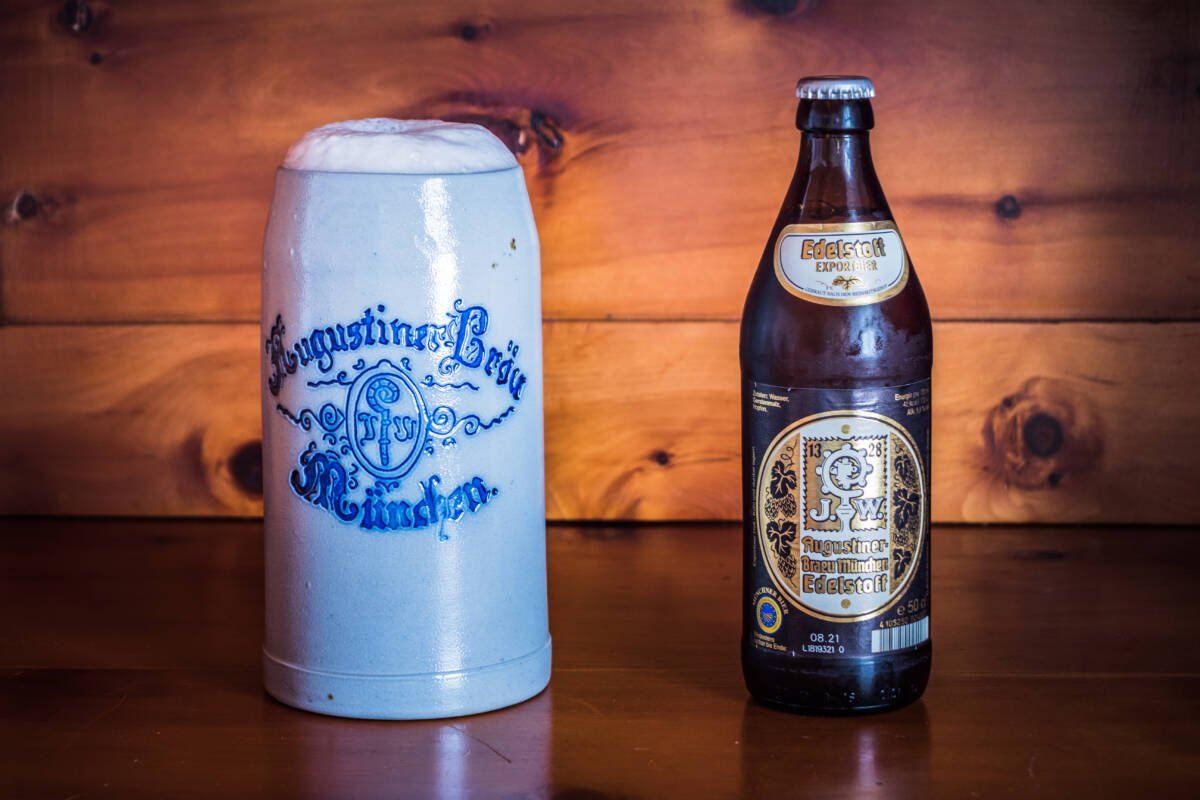
This is Munich’s oldest brewery, dating back to 1328. It was established within an Augustinian monastery and supplied beer to the Bavarian royal family.
Today, it’s the only brewery in Munich that still uses wooden barrels for storing beer. Their splendid history has generated a huge fan following amongst locals and beer-fans from around the world. The highlight being their vintage horse-drawn beer wagons that are always seen at Oktoberfest.
Their beer with the distinctive monk’s logo is served in several Munich pubs and several beer gardens. The original brewery building is located in the heart of Neuhauser Strasse in Munich’s old town. Don’t miss their “Augustiner Edelstoff,” a traditional beer, brewed with noble raw ingredients.
Hacker-Pschorr
The brewery was first mentioned in a document in 1417 and was located in Sendlinger Strasse. In the 18th century, under the leadership of couple Maria Theresia Hacker and Joseph Pschorr, it developed into Munich’s leading brewery. Hacker and Pschorr were later continued by their sons as separate breweries, and became a common brand once again in 1972.
Today the brewery is located in the same premises as the Paulaner Brewery, but retains its brewing independence. All their beers have traditional swing tops as well, so they are twice more fun to drink. Don’t miss their “Kellerbier” with fruity notes and tastes of honey and caramel. It’s also less carbonated and easy to drink.
Lowenbrau
Lowenbrau translates to Lion’s brew and for a long time has been one of the most widely distributed beer brands in Germany. In 1746, its name appeared for the first time in the list of beer brews of Munich. It is noted that a lion fresco was hanging above the brewery at one point and that is where it seems to have gotten its name. They specialize in pils beer.
The best way to visit this brewery and beer hall is by visiting Löwenbräukeller, which is a historic restaurant, beer cellar, and event venue. The Lowenbrau tent at Oktoberfest is also fun to walk past with the roaring lion, you can’t miss it. Don’t miss their “URTYP” which is a traditional pils beer brewed just like they did hundreds of years ago.
Paulaner
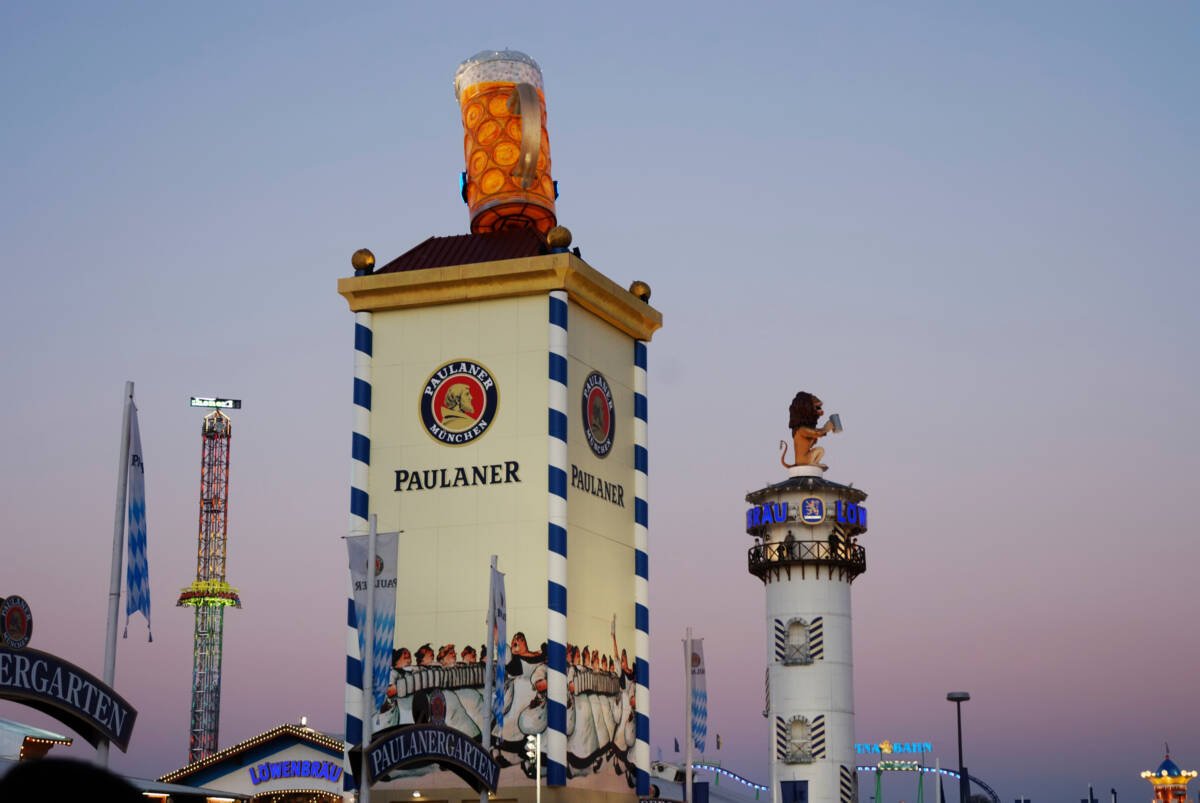
Since 1634, this beer has been brewed in the Paulaner monastery. It is named after Francis of Paolo, founder of the order. In the olden days, the beer was only served to the public during festivals, else it was reserved for the monks.
On the day they served beer to the public, the monastery shared this brew with local politicians too. To this day, the tradition carries on – at the start of StarkbierFest when the first litre of beer is given to the Bavarian Minister President to kick off the festival.
Today, the brewery is located in Munich-Langwied and is the largest in Bavaria. Don’t miss their “Salvator” Doppelbock, a bottom-fermenting strong beer first created by the Paulaner monks.
Spaten
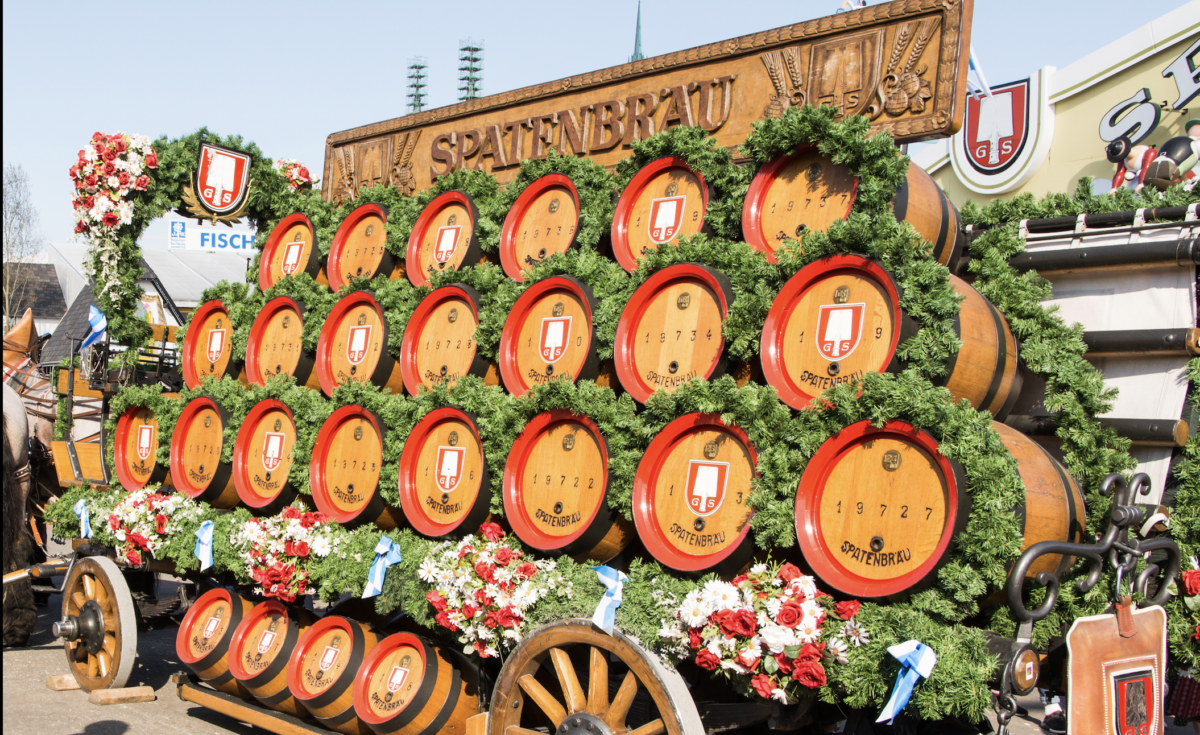
The Spaten brewery was founded in 1397 and for the first few centuries it was located in Neuhauser Gasse. In the 19th century, the brewery moved to Marsstrasse, where it is still located. It deserves the honour of being the first brewery to bring the “Münchner Hell” (Munich Pale) to market in 1894 – a bestseller to this day.
At the peak of the brewing industry in Munich, it was the largest brewery in the area. But after the Second World War, it was never able to make a full comeback. Fast forward today, it is still relevant in the beer scene. Don’t miss their “Spaten Helles,” Munich’s original Helles beer, or try the Franziskaner Weissbier.
Hofbrau
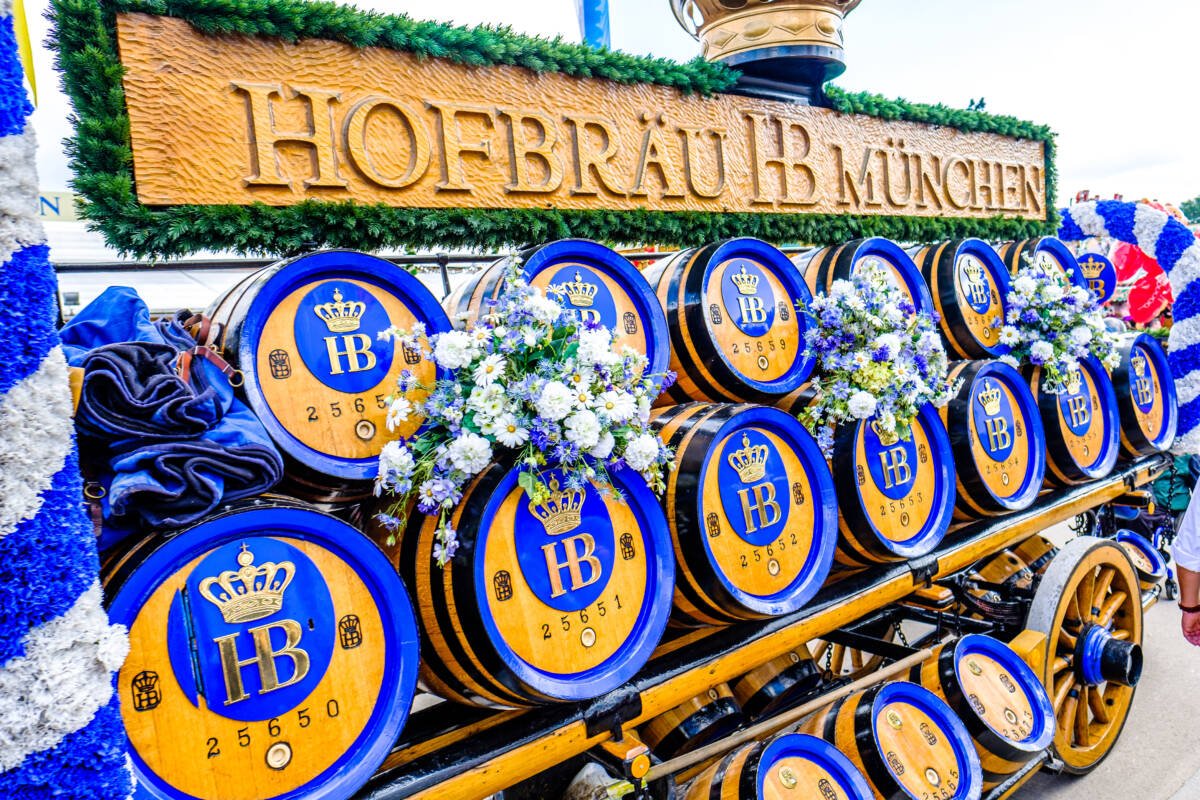
Hofbrau is a state-owned brewery and was founded in 1589 by the Duke of Bavaria, Wilhelm V. The highlight of this brewery is their historic beer hall, which is nearly 500 years old and the most famous beer tavern in the world.
It was founded as the brewery to the old Royal Residence, which was just around the corner from where the beer hall stands today. Their beer became extremely popular once the Bavarian Beer Purity Law was enacted in 1516 that stated only natural ingredients could be used in the brewing process. Since then, it has become a worldwide phenomenon as a place to gather, enjoy beer, and have a good time.
The beer hall finds its place in modern history too as during the Second World War, it’s here Hitler drank beer with members of his party. Don’t miss their “Hofbrau Original,” a classic bitter, but refreshing beer as it’s known around the world.
Got curious? Join our Munich brewery tour that actually takes you to a brewery to see how beer is made!
Munich Beer Festivals and Events
If you are planning a trip to Munich, remember to check out if your date coincides with any of these beer festivals and events.
Oktoberfest
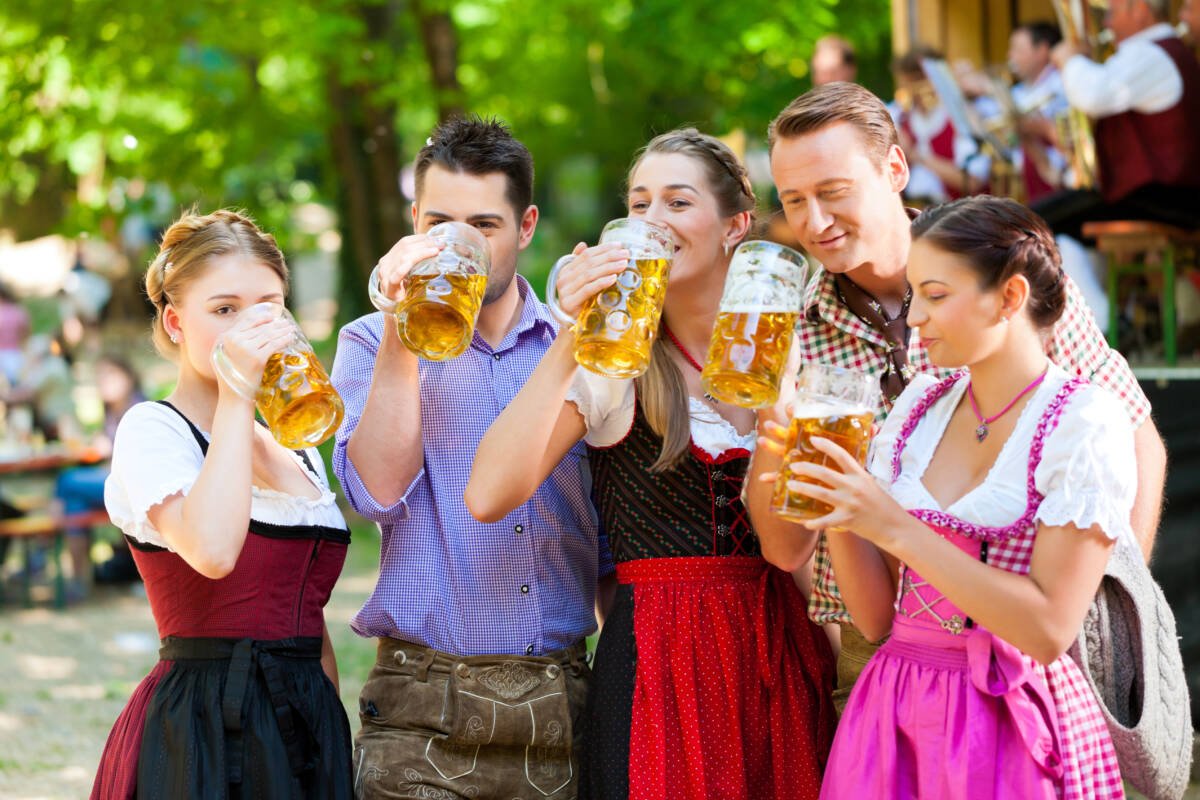
If you like to compare beers of the big six Munich breweries, then you must visit the Oktoberfest – this is the world’s largest beer festival. It attracts millions of people from around the world for two weeks starting at the end of September. There are dozens of tents that serve the best of Munich beers and are full of music and lively people. There are also outdoor beer gardens, shops, restaurants and carnival rides. Beer fans, this must be on top of your bucket list.
Starkbierfest
The Starkbierfest (Strong Beer Festival) takes place during lent and is held to enjoy the dark Doppelbock lager known as Starkbier. The festival takes place inside the original Paulaner Brewery and has a similar vibe to Oktoberfest that involves live bands, dancing and lots of drinking. The festival starts around St. Joseph’s Day and lasts for a whopping 20 days.
Frühlingsfest
As the name Frühlingsfest (Spring Festival) suggests, this Munich festival takes place in spring. It is often said to be the little sister of the Oktoberfest and held in the same location. There are three tents and a handful of rides. This event is popular amongst youngsters and local crowds. It’s also a great way of enjoying the warm weather in Munich. This event typically takes place at the end of April to the beginning of May.
Volksfeste
As the season of Autumn arrives many small towns near Munich such as Regensburg, Dachau, and Augsburg celebrate smaller folk festivals. During these festivals people sip on a variety of local beers, dress up in traditional Tracht, while the younger ones enjoy carnival rides and games.
Beer Etiquette and Traditions
Now that you know about the popular beers and breweries in Munich, it’s time to understand their beer etiquettes and traditions, so you can drink like a true Bavarian.
When you CHEERS in Munich, tap your beer glasses with EVERYONE individually at your table, make eye contact and say – “Prost!”
Enjoy your drink as you make new friends and at the same time know your limits – “Stay Friendly!”
If you are attending a traditional Munich beer festival, it’s best to be dressed in a local traditional attire. It is common for people to wear their Tract, also known as Dirndls for women and of course Lederhosen for men – “So Dress Up!”
Pfand and the Cost of Beer: In Munich most beer gardens will charge a high price or Pfand (deposit). This is basically a deposit for your beer stein. You get this fee back when you return your beer stein. In Munich, beer prices vary – at a kiosk, beer is cheaper as compared to a restaurant and is expensive at a beer garden. Oktoberfest beers are the most expensive and it’s customary to tip your server even after paying a higher price.
The Pour: Germans take their beer seriously and have perfected the art of pouring beer. Therefore, it’s a rule that beer should be served in a proper glassware and should have an ideal head on top. Amazingly, breweries in Munich can be fined for not following the beer portions.
Beer and Brewery Tours with Rosotravel
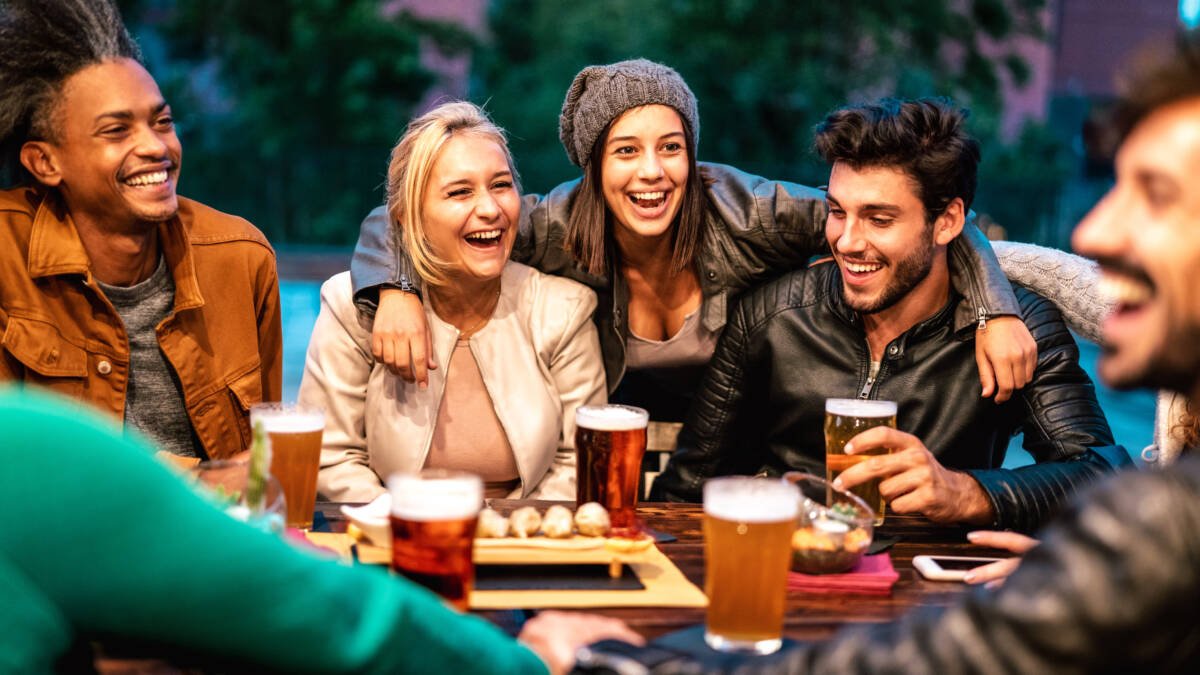
Ready to drink some of the best beer of your life? Join our Munich Brewery or Beer Tasting Tour for an exclusive beer and city experience. We’ve put together one of the most ultimate and stress-free beer tasting tours in Munich you can dream of.
And if you enjoy learning about beer (more than drinking it) then spend an hour or so at the Beer and Oktoberfest Museum in Sterneckstrasse, not far from the Viktualienmarkt. There’s lots to explore at this museum which takes up several floors and has a wonderful video on beer-brewing. There is also a pub within its premises.
Recommended Tour: Munich Beer Tasting and Oktoberfest Museum Private Guided Tour
Share Munich Breweries!
Make sure you share this post with all your beer loving friends and enjoy a beer filled trip to Munich.
Join our Munich brewery tour and along with it explore some historical spots in Bavaria.
Which are your favourite Munich beers? Let us know in the comments!


